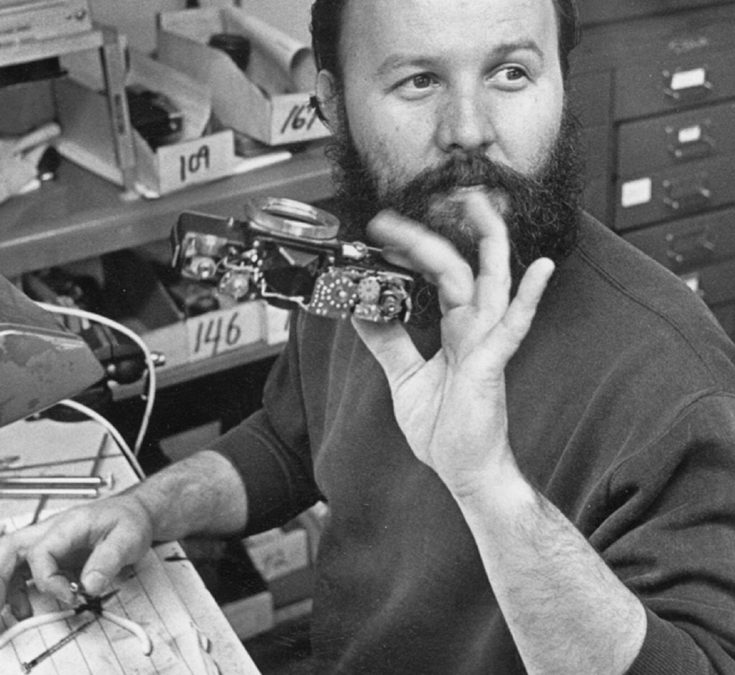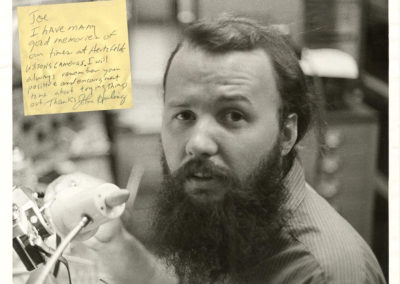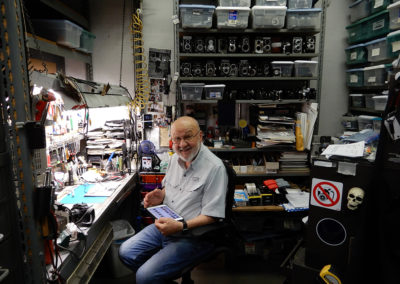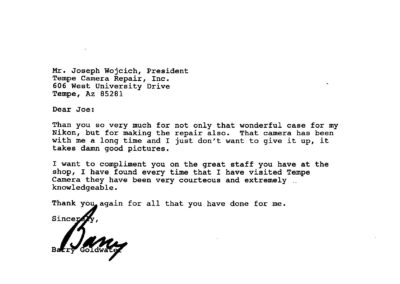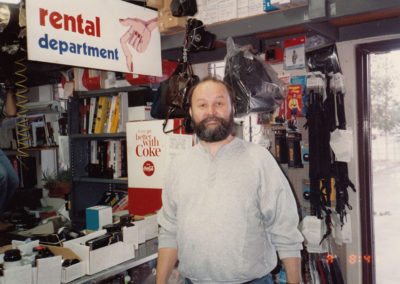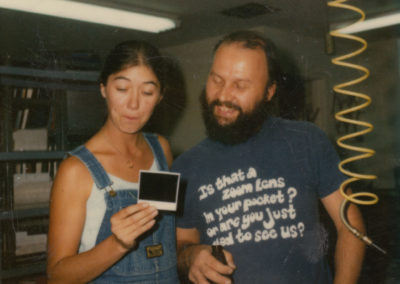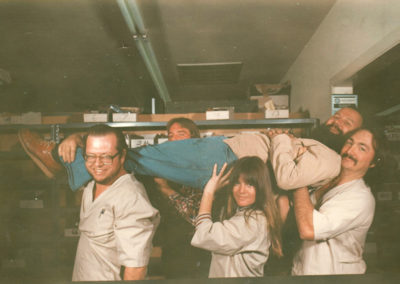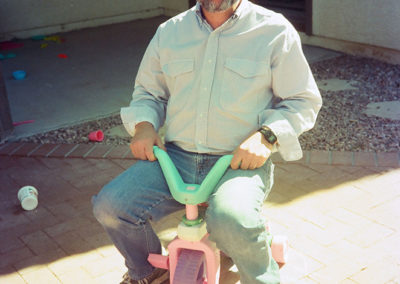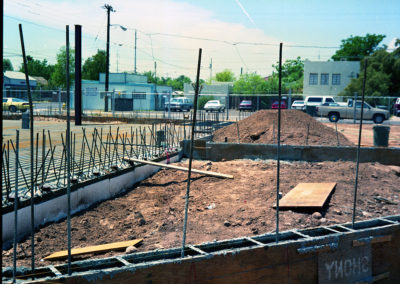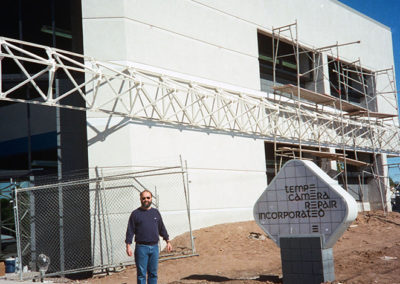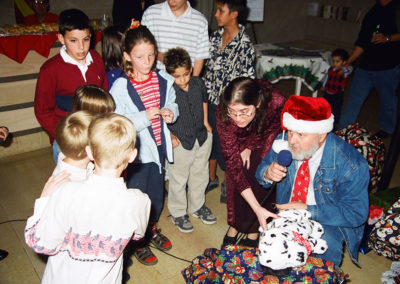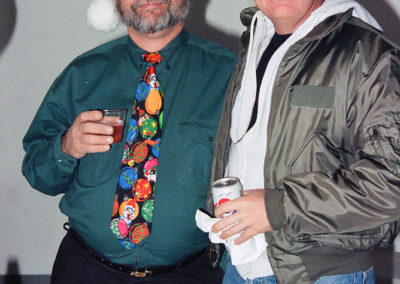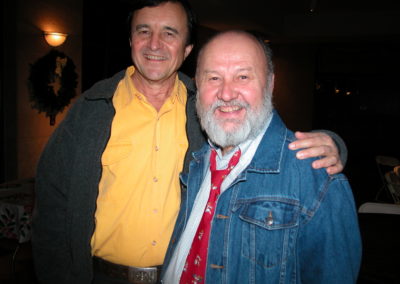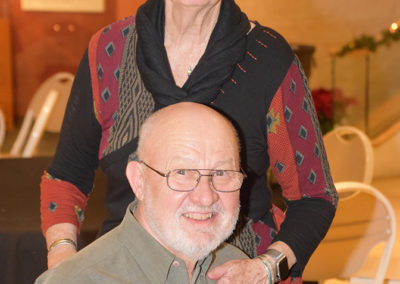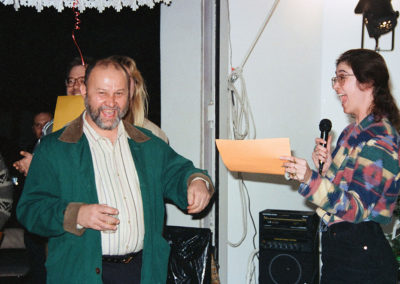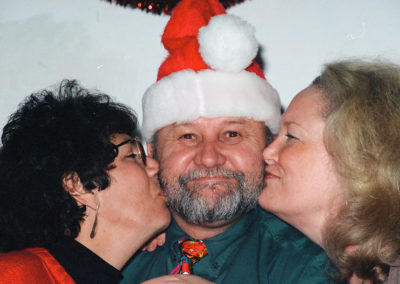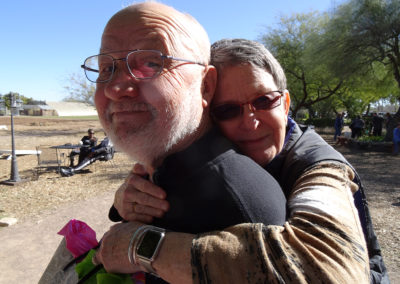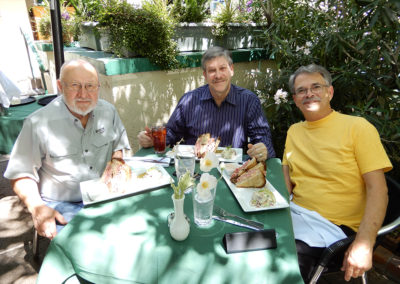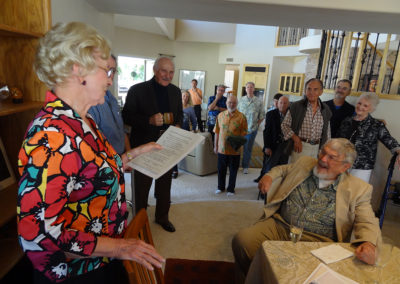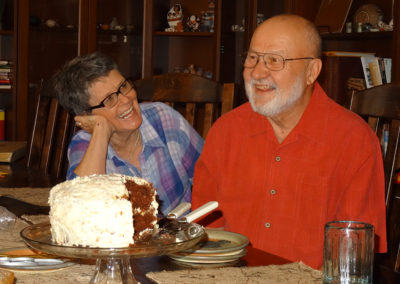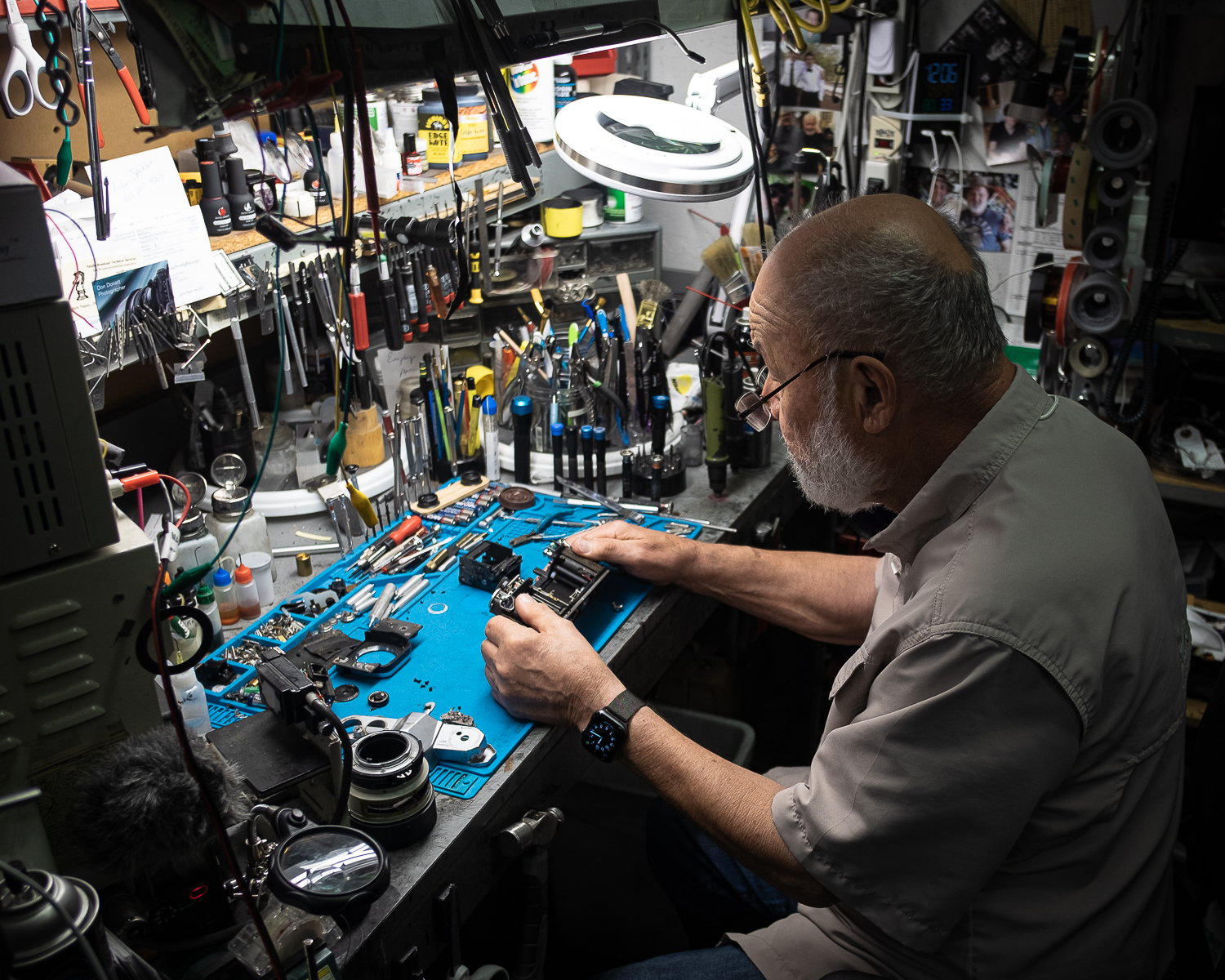
© 2021 Mark Timpany. Joseph Wojcich at the repair bench.
Early History
The 50-year history of Tempe Camera tracks many changes in photography. AZPA members can get an informed view of those changes from the path traveled by its founder and owner Joe Wojcich. Jeff Luth and Mark Goldstein reveal their devotion to both the business and its remarkable history in the following tribute and celebration of its first half century.
After high school, Joe served as a machinist in the U.S. Air Force from 1964 to 1968. Tours in Hawaii and Guam initiated his life-long love of world travel. Back in the States, he took a job in Phoenix with Johnson Evinrude making custom racing boat motors. In 1970, his affection for photography led him to take a job working at Wilson Camera in downtown Phoenix.
Joe quickly became the ‘guy in the back’ who could get broken cameras working. His business career was effectively launched when Wilson’s owner, Arthur Hertzfeld, offered to split the proceeds from sales of repaired cameras. Soon afterwards, Joe’s skills at camera repair were bringing him significant additional income, and he established relationships with several other Phoenix camera stores to fix their customers’ cameras as well. In 1975, after Wilson Camera moved to a newer location nearby, Joe set forth on his own, leasing a 500-square-foot space about a block west of the present-day Tempe Camera Repair (TCR). His neighbor did musical instrument repair and the two businesses fed from each other.
Expansion and Custom Work
As Joe’s business blossomed, he invested in people, technology and infrastructure. After migrating from Wilson Camera to a modest building of his own, Joe bought nearby land at the corner of Roosevelt and University. Between 1986 and 1987 he constructed a 10,000-square-foot building with two floors and a full basement where he began a photo lab operation.
Joe used the new building to install a robust machine shop to fabricate parts and adapt gear to different platforms. This customization service attracted customers from around the world.
The Canon 400mm f4.5 was the preferred glass by the Associated Press sports photographers; however, they knew and loved the Nikon body. Joe recalls one project for the AP when he modified 10 Canon lenses to operate in a Nikon body . . . just in time for the Moscow Olympics!
Evolution: Film to Digital
In 1975 there were under a dozen other competitors specializing in film processing. By the 1980s TCR’s lab business took off and Joe built a 7,000-square-foot photo lab across the street. As photographers moved from film to digital and many area photo labs shut down, TCR’s lab built a sustainable business for those professional photographers still shooting film.
During the film heyday, TCR employed two shifts processing 2,000 rolls of film each week! Today, film use is largely driven by students, artists and a few event photographers. While there has been a recent resurgence in film purchases and processing, Joe states, “I don’t know how much longer film is going to be around.” He adds, “It’s like someone turned on a switch and film was gone.” Or nearly gone. TCR’s photo lab still offers services for large-sized prints, mounting, framing, scanning, and color film processing and printing.
The advent of digital photography has changed the game. Amongst the digital camera lines, Joe’s favorite is Fujifilm and especially the mirrorless Fuji X. It is perfect for the type of traveling Joe loves. Shooting in crowded street markets of Vietnam or ancient cities of Western China, Joe’s friendly, unassuming manner is welcome. And Joe’s travels have fostered a deep fondness for Asian food. When Jeff Luth visited Joe once, he was invited to grab lunch. Jeff assumed they would head to one of the many spots on University near TCR. Jeff should have known better . . . they hopped into Joe’s car and drove to Mesa for some outstanding Vietnamese cuisine in one of his favorite restaurants.
Equipment Rental Business
When their cameras are out for repair, photographers are not happy. With equipment increasingly based on proprietary, electronics-based designs, cameras are far less likely to be repaired in the field. Professional photographers have joined service groups with Canon, Nikon and others, who offer fast turnaround repairs or loaners for a yearly fee. Photographers are also interested in ‘test-driving’ equipment or grabbing a particular camera or lens for a shoot. Jeff remembers renting a 500mm lens simply to capture a bald eagle on the Salt River Pima Indian Community. He got some nice shots before being chased away by the community police! As a result of changing dynamics and greater technology integration, there is far less repair work, and equipment rentals have become TCR’s cash cow!
Support of Photographers and Community
Joe is humble and reserved and has been an invaluable friend and patron to working photographers and dedicated amateurs. He has often been thanked for doing “free” repairs, making connections to promote their work, and even mounting shows for them. Among those who found Joe’s friendship and support invaluable were the late Daniel Budnik and the late Allen Dutton.
Dan was an American photographer with Arizona roots. Noted for his photographs of the civil rights era and Native American life, Dan’s work was often printed by Joe who also helped support the design and production of Dan’s seminal collection of civil rights images, Marching to the Freedom Dream. As Dan’s health declined, Joe made many trips to Tucson to spend time with Dan and his family. He mentored Allen, also a renowned photographer with a celebrated body of images, books and writings. Teaching at Phoenix College, Allen inspired generations of photographers and to Joe, he was like one of the family. After Allen’s death in 2017, Joe helped arrange and host a celebration of his life at the Arizona Historical Society. Joe’s mentoring was contagious!
Customers, staff and their families fondly remember Tempe Camera Repair’s long-standing history of Christmas parties. Joe collected toys and other gifts, and they were distributed to children in front of a large photo mural of a Christmas tree decorated with employee headshots inside an ornament.
The basement at TCR often serves as a classroom for the photography community and a “Special Room” that was constructed to keep out the light provides a space for several devices, including a sizable one designed to enlarge negatives and film-based output. The museum-like quality of this space provides opportunity to store archives containing reams of curated photos including a masterful collection of images from the late Allen Dutton.
A Consummate Businessman
In 1994, Joe was designated the Small Business Person for the State of Arizona by the U.S. Small Business Administration. He and his wife Eloisa attended a White House reception with President William J. Clinton. This was followed by a celebratory breakfast at the Tempe Mission Palms with 300 attendees.
While the staff has shrunk since the 1970’s, many employees have been with Joe for 20 years and longer. TCR’s general manager Susan Smith has been there for 43 years!
Tempe Camera celebrates its golden Anniversary on April 1, 2022. Joe Wojcich has had a front row seat on technical changes in photography for half a century. He describes his life in photography as “50 years on the bench.” As he looks back on his career and the history of Tempe Camera Repair Joe is happy to share, “We are grateful for 50 years of great staff and customers, and we continue to have a good run.”
Acknowledgements
The authors would like to thank Susan Smith, TCR’s general manager for her anecdotes, feedback, and access to historical photos from TCR’s archives. The authors would also like to credit the earlier AZPA blog post 50 Years on the Bench by Mark Timpany that provided inspiration and elements seeding this expanded view of and tribute to Joe Wojcich’s photographic journey.
Jeff Luth and Mark Goldstein
Jeff Luth, Contributing Writer
A New Jersey native, Jeff Luth is a former corporate banker, former chief communications officer at Amkor Technology, and an executive search consultant. He has been involved in the semiconductor industry for over 20 years. Recently ‘retired’ Jeff remains busy producing résumés and LinkedIn profiles for executives who see the value in maintaining a compelling professional presence. Jeff is a founding member of the Arizona Photography Alliance and former editor of the AZPA blog. In 2021 Jeff moved to Massachusetts to be closer to his family.
Mark Goldstein, Contributing Writer and Photographer
Mark Goldstein has been an avid shootist for over 50 years having gotten his Bachelor of Arts in Motion Picture Production from SUNY Binghamton in 1972, subsequently moving to Arizona, and becoming Joe Wojcich’s first employee in his nascent camera repair operation. Mark went on to have an 18-year career in engineering and engineering management for MicroAge, Medtronic, and others followed by some 30 years operating International Research Center, delivering research and consulting services to high-tech clients and sectors.
Here in Arizona, Mark is chairperson of the Arizona Telecommunications and Information Council with its statewide Digital Equity initiatives, sits on the board and executive committee of the Arizona Technology Council, and is active with the Arizona Bioindustry Association, the Arizona Energy Consortium, and other regional and national groups.
Mark’s black-and-white photos from the early 1970s of the American independent film movement and of Nicholas Ray, noted Hollywood director, have appeared in two movies, several documentaries, some dozen books, and numerous magazine articles and posts. He continues to be an enthusiastic photographer of people and places, especially out and about in the Arizona technology ecosystem, in his wife Liz Warren’s storytelling community, and socially as his life takes its course.
Mark recently had the bulk of his historical film materials (negatives, slides, stereos, 8- and 16-mm film) digitized and looks forward to uncovering and sharing new “blasts from the past” in the days to come. He’s just upgraded to the Nikon Z9 camera system (through Tempe Camera of course) and is gradually adapting to mirrorless, full frame, “smarter” hopefully better shooting and results.

